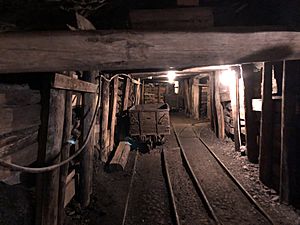State Coal Mine facts for kids
The State Coal Mine is a special place in Wonthaggi, Victoria, Australia. It used to be a big mine where people dug for black coal. This mine was owned by the state government. It operated for many years, from 1910 until 1968. Today, it is no longer a working mine. Instead, it is a state park and a popular place for tourists to visit. It's also known as the State Coal Mine Heritage Area.
Contents
Discovering the State Coal Mine's Past
The State Coal Mine has a long and interesting history. The coal found here is incredibly old, more than 150 million years old! Imagine how long ago that was. The mine's tunnels are huge, stretching for almost 5,000 kilometers. They form a giant underground ring right around the town of Wonthaggi. The mine was also built close to the old railway line that went to Melbourne.
Why Wonthaggi Became a Mining Town
The State Coal Mine and the town of Wonthaggi started in 1909. They were created to provide coal for the Victorian Railways. Trains back then needed a lot of coal to run. Wonthaggi began as a simple "Tent Town" where miners lived. But it quickly grew into the busy town we know today.
How Much Coal Was Mined?
The mine operated for nearly 60 years, from 1909 to 1968. During that time, it produced almost 17 million tonnes of coal. That's a massive amount! In 1926, the mine was at its busiest. It produced 2,435 tonnes of coal every single day. The Victorian Railways bought 90% of all the coal mined here. This mine was one of Australia's largest. It was also known for being quite dangerous for the workers.
The Mine's Final Years
By the 1930s, things started to change. There were some worker strikes, and the bigger coal seams began to run out. This meant less coal was being produced. However, the government helped keep the mine open. It continued to operate until 1968. By then, most trains were no longer using steam power and coal.
Visiting the State Coal Mine Today
Today, the State Coal Mine is a fantastic place to visit. Parks Victoria manages the site. It is open to everyone who wants to explore this historic mine. It's the only place in the Southern Hemisphere where you can experience a historic coal mine like this.
What You Can See and Do
A visit to the State Coal Mine is like stepping back in time. You can discover what life was like for coal miners in the 1900s. It's a great learning experience for families. You can take a tour deep into the underground tunnels. You'll learn how the miners extracted the valuable "black gold" (coal).
Here are some of the exciting things you can do:
- Take a guided tour underground into the coal mine.
- Visit the gift shop and grab a snack at the cafe.
- Explore the museum to see tools and stories from the past.
- Get information at the visitor centre.
- Watch videos and learn more at the theatrette and interpretive centre.
- Enjoy walking tracks and picnic areas with BBQ facilities.
- See historic buildings and follow a heritage trail.
Recent Upgrades for Visitors
In 2012, the site received a big upgrade. About $3 million was spent to make it even better. This allowed the underground tours to start again. They had been closed for eight years to make sure everything was super safe for visitors.
 | Laphonza Butler |
 | Daisy Bates |
 | Elizabeth Piper Ensley |


